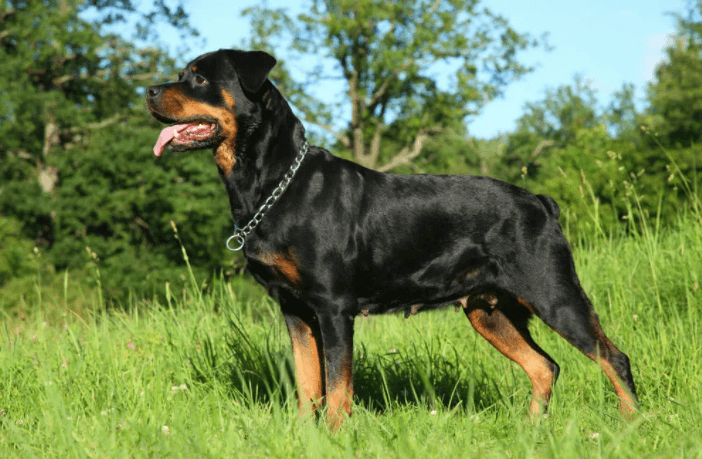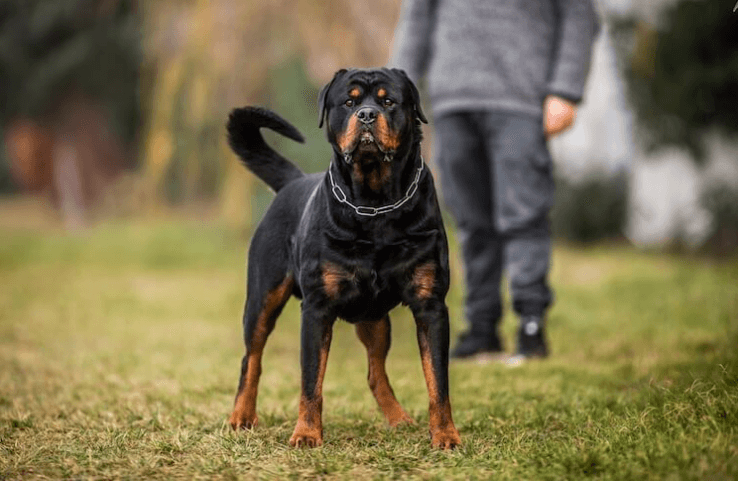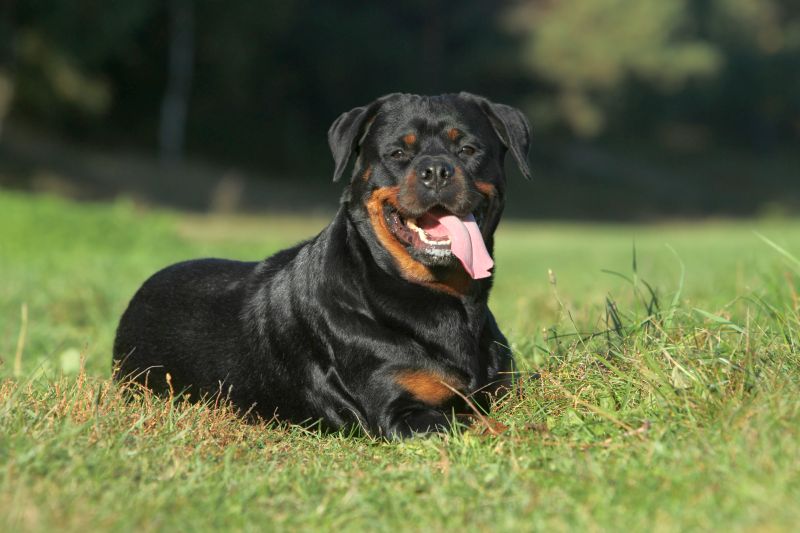Rottweiler
Rottweiler Complete Breed Information
Discover the Rottweiler, a breed that has captured the hearts of dog lovers across the world with its impressive strength, unwavering loyalty, and remarkable intelligence. These powerful canines trace their roots back to the German town of Rottweil, where they earned the name "Rottweiler Metzgerhund," or "Rottweil butchers' dogs," for their invaluable assistance to local butchers. As time passed, Rottweilers proved their versatility by excelling in various roles, from serving as courageous police dogs to providing guidance as devoted guide dogs and even saving lives as skilled search-and-rescue dogs. With proper training and socialization, these magnificent dogs can become the ultimate family companion, offering protection, affection, and an unbreakable bond that will stand the test of time. If you're seeking a dog that combines strength, intelligence, and loyalty, the Rottweiler might just be the perfect breed for you.
Weight
- Male: 90-135 lbs
- Female: 80-100 lbs
Height
- Male: 24-27 Inches
- Female: 22-25 inches
Life Span
- 10-12 Years
Appearance

Rottweilers are powerful, muscular dogs with a commanding presence. Standing 22 to 27 inches tall at the shoulder and weighing between 80 and 135 pounds, these impressive canines have large, broad heads and sturdy bones. Their short, glossy coats are black with distinctive rust-colored markings on the face, chest, and legs.
One of the most striking features of the Rottweiler is its blocky head, with a square, robust muzzle and ears that sit close to the skull. Their lips are slightly loose, which can lead to a bit of drooling. The breed standard calls for a thick, rough coat, and while the occasional "fluffy" puppy may appear in a litter, this coat type is not desirable in the show ring.
Rottweilers are slow to mature, often not reaching their full adult size until two or three years of age. As they grow, their chests expand, and they develop into the massive, impressive dogs we know and love.
Originally bred as working dogs in ancient Rome, Rottweilers have a long history of serving alongside humans. Today, they can make wonderful, affectionate family pets when properly trained and socialized. Traditionally, Rottweiler puppies have their tails docked, leaving only a small nub on their backsides. However, this practice is controversial, with some arguing that it is unnecessary and potentially painful for the dog.
Whether you're drawn to their powerful presence or their loyal, loving nature, the Rottweiler is a breed that commands respect and admiration from all who encounter them.
Temperament
Rottweilers are intelligent, devoted companions that thrive on mental stimulation and consistent training. With their large heads and equally impressive brains, these dogs require experienced owners who can provide regular learning opportunities and positive reinforcement to keep them mentally and physically satisfied.
The ideal Rottweiler is a picture of calm confidence. It displays a self-assured aloofness towards strangers while remaining fiercely loyal to its family. Rottweilers possess a natural protective instinct but should never resort to aggression without provocation. They have a strong work ethic and are highly adaptable, making them excellent candidates for various roles.
Male and female Rottweilers exhibit some differences in temperament. Males tend to be more watchful and reserved, constantly surveying their surroundings for potential threats. Females, on the other hand, are often more affectionate and easier to manage. Both sexes are highly trainable but may display a stubborn streak at times.
To bring out the best in a Rottweiler, owners must establish clear boundaries and consequences for misbehavior, earning the dog's respect through patience and consistency. Harsh treatment is never necessary; a firm verbal correction is often sufficient, provided the owner has established their authority.
Early socialization is crucial for Rottweilers, exposing them to a wide variety of people, places, and experiences from a young age. Puppy kindergarten classes, regular visitors to the home, and frequent outings to dog-friendly locations can all contribute to a well-rounded, socially adept adult Rottweiler.
Ultimately, the Rottweiler is a loyal, intelligent, and protective companion that requires a dedicated, experienced owner willing to invest time and effort into their training and socialization. With the right guidance, these impressive dogs can become the ultimate family guardian and devoted friend.
Living Conditions

Rottweilers are devoted family dogs that thrive on being close to their owners, making them ill-suited for a life confined to the backyard. Despite their imposing size, these gentle giants are often content to relax indoors with their loved ones. However, they do require a securely fenced yard to protect them from traffic and prevent potential aggression towards unfamiliar dogs or people. It's important to note that an underground electric fence is not a sufficient deterrent for a determined Rottweiler, nor does it prevent others from entering your property. Posting a warning sign can help alert visitors to proceed with caution.
The energy levels of Rottweilers can vary greatly, ranging from laid-back couch potatoes to high-energy whirlwinds. When selecting a puppy, it's essential to communicate your lifestyle and activity preferences to the breeder, ensuring they can match you with the perfect companion. For moderately active Rottweilers, a couple of 10- to 20-minute daily walks, combined with engaging playtime and ball games, can provide sufficient exercise.
More energetic Rottweilers may require longer exercise sessions and structured activities to keep them physically and mentally stimulated. These intelligent, agile, and highly trainable dogs excel in various pursuits, such as agility, obedience competitions, tracking, therapy work, and even their traditional role of pulling carts or wagons.
By understanding the Rottweiler's need for companionship, exercise, and mental stimulation, owners can create a fulfilling environment that allows these loyal and loving dogs to thrive as cherished members of the family.
Care

Clean this up and make sure it is short, 100 original content, engaging, and concise. You can rewrite if you want, but keep the essence the same. I want to make sure it is engaging and reads well, and if you want to make it longer, you can or not; it's your choice.
When it comes to grooming, Rottweilers are a low-maintenance breed. Their short, dense coat requires weekly brushing to remove loose hair and maintain a healthy shine. Bathing every few weeks is usually sufficient, unless your Rottweiler has gotten into something particularly messy.
Twice a year, during shedding season, you may notice an increase in loose hair around your home. More frequent brushing can help control the shedding and keep your Rottweiler's coat looking its best.
In addition to coat care, it's essential to maintain your Rottweiler's overall hygiene. Regular tooth brushing helps prevent dental issues, while nail trimming every few weeks keeps their feet comfortable and prevents overgrowth. Checking their ears and cleaning them as needed can help avoid infections.
By staying on top of your Rottweiler's grooming needs and embracing their willingness to learn, you'll not only keep your dog looking and feeling great but also strengthen the bond between you and your loyal companion.
Health
Rottweilers are generally healthy dogs, but like all breeds, they are prone to certain health issues. While not every Rottweiler will develop these conditions, it's crucial for potential owners to be aware of them.
Responsible breeders will be transparent about the health issues in their lines and the frequency at which they occur. Be wary of any breeder who claims their dogs are 100% healthy or keeps their puppies isolated from the rest of the home for health reasons.
One of the most common health concerns in Rottweilers is hip dysplasia, a hereditary condition where the femur doesn't fit properly into the hip socket. The severity can range from mild to severe, with the latter often requiring surgery and leading to arthritis later in life. Rottweilers are also susceptible to elbow dysplasia and osteochondrosis of the knee and shoulder.
Eye problems, such as progressive retinal atrophy (PRA), cataracts, and eyelid abnormalities, can affect Rottweilers. They may also develop cardiac issues, including cardiomyopathy and subaortic stenosis (SAS), which can cause heart murmurs and even sudden death in young dogs. Regular heart check-ups are essential.
Other health concerns include von Willebrand's disease (a blood clotting disorder), hypothyroidism, Addison's disease, gastroenteritis, folliculitis, and a higher risk of cancer.
Predicting whether a puppy will develop these issues later in life can be difficult. The best approach is to find a reputable breeder who prioritizes the health of their dogs and can provide independent proof that the parents and grandparents have been tested and deemed fit for breeding.
While this list of potential health issues may seem daunting, many Rottweilers live long, healthy lives with proper care and attention. By working with a responsible breeder and staying informed about the breed's health concerns, you can help ensure your Rottweiler remains a happy, healthy companion for years to come.
History

With a rich and fascinating history, that can trace its origins back to the days of ancient Rome. Believed to have descended from the powerful Mastiff, these intelligent and hardworking dogs have proven their versatility and adaptability throughout the centuries.
In the German town of Rottweil, Rottweilers found their calling as exceptional herding dogs, skillfully driving livestock and pulling carts laden with goods. Their strength, loyalty, and protective instincts made them invaluable companions to butchers, who entrusted them with guarding their shops and even transporting meat to market.
As the breed's reputation for diligence and reliability grew, Rottweilers were called upon to serve in various roles, including as police dogs. Their imposing presence and unwavering courage made them well-suited for law enforcement work, further cementing their status as a breed of remarkable abilities.
It wasn't until the early 20th century that the Rottweiler began to gain recognition in the United States. The American Kennel Club formally acknowledged the breed in the 1930s, and since then, the Rottweiler's popularity has soared. Today, this impressive dog ranks as the eighth most popular breed in the country, a testament to its enduring appeal and the deep bond it forms with its human companions.
From the streets of ancient Rome to the homes and hearts of modern-day dog lovers, the Rottweiler has left an indelible mark on the world of canines. Its legacy as a tireless worker, loyal protector, and devoted friend continues to inspire and captivate those who have the privilege of sharing their lives with this truly remarkable breed.
Final Thoughts
The Rottweiler has won the admiration and affection of countless dog lovers with its impressive strength, unwavering loyalty, and gentle nature. Despite their intimidating appearance, these gentle giants are often affectionate and loving family companions who thrive on human interaction and bond deeply with their owners.
If you have a spacious home with a garden and an active lifestyle that includes plenty of walks and outdoor adventures, a Rottweiler might just be the perfect fit for your family. These intelligent and adaptable dogs excel in various activities, from agility and obedience to flyball, making them fantastic partners for those who enjoy training and engaging with their canine companions.
Rottweilers are known for their patience and gentleness with children, as well as their ability to get along with other pets when properly socialized. Their protective instincts and devoted nature make them exceptional guardians, always ready to watch over their loved ones.
While their short coat may seem low-maintenance, it's important to note that Rottweilers have a double coat and shed considerably throughout the year. This may pose a challenge for allergy sufferers in the family, so it's crucial to consider this aspect before welcoming a Rottweiler into your home.
When adopting a Rottweiler, it's essential to prioritize responsible breeding practices and inquire about the health certificates of the puppy's parents. Like many large breeds, Rottweilers can be prone to certain hereditary health issues, so it's paramount to work with a reputable breeder who prioritizes the well-being of their dogs.
The Rottweiler is a breed that offers a unique combination of strength, loyalty, and affection. With proper training, socialization, and love, these magnificent dogs can become cherished members of the family, enriching the lives of those fortunate enough to share their journey. So, if you're ready to welcome a devoted and impressive companion into your life, the Rottweiler might just be the perfect match for you.








Comments